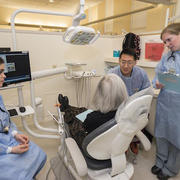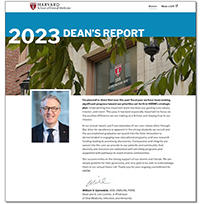
Serving on the front lines of health care, a nurse practitioner may very well be the first to identify a patient’s oral health condition or disease, even before their dentist. A new national study conducted by Harvard School of Dental Medicine and its partners in the Center for Integration of Primary Care and Oral Health (CIPCOH), reveals nurse practitioners are well-prepared to meet this challenge.
The survey of nurse practitioner (NP) training programs focused on pediatric, family, and adult-gerontology primary care programs, with the purpose of assessing how well oral health was integrated in the educational curricula. The large majority of respondents indicated high levels of satisfaction with graduates' level of oral health training and competence. Results of the study were recently published in a paper in the Journal of the American Association of Nurse Practitioners.
“Our study findings hold promise for addressing the gap in access to oral health care and eliminating oral health disparities in the United States,” said co-author Maria Dolce, PhD, RN, Associate Professor at Stony Brook University School of Nursing. “The majority of licensed nurse practitioners are primary care providers and comprise a significant proportion of the primary care workforce. Nurse practitioners are prepared to broaden access to oral health care and decrease health disparities, particularly for vulnerable and underserved populations,” she added.
Since 2000, when the U.S. Surgeon General called for increased awareness of the importance of oral health to overall health, efforts to bring oral health into primary care training have been steadily gaining ground.
“Having nurse practitioners invested in the role oral health plays in overall health is vital,” said co-author and lead Principal Investigator Christine Riedy, MA, PhD, Chair and Delta Dental of Massachusetts Associate Professor of Oral Health Policy and Epidemiology at Harvard School of Dental Medicine (HSDM). “They are often embedded in places like schools, nursing homes, and health centers where oral health providers may not be, that’s why they are such powerful allies in identifying oral health conditions and recognizing inequities in access to dental care,” she said.
The study points to several academic institutions that have led the way in training and practice—New York University Rory Meyers College of Nursing, and Northeastern University School of Nursing. Both programs have advanced interprofessional education stressing the oral-systemic health connection.
Northeastern University School of Nursing and Harvard School of Dental Medicine tested a unique, interprofessional collaborative practice model, the Nurse Practitioner and Dentist Model for Primary Care (NPD Model), that brought nursing and dental students together in a clinical setting to improve health for older adult patients living with chronic health conditions.
“The nurse practitioner-dentist model enabled dental students to see firsthand how a nurse practitioner can interface with patients and dental providers seamlessly integrating care, and contributing to the patient’s overall health care,” said Co-Principal Investigator of the NPD Model John D. Da Silva, DMD, MPH, PD, Vice Dean at Harvard School of Dental Medicine.
While progress has been made, more work is to be done to advance these efforts. The authors propose recommendations to continue to cultivate NP faculty champions, as well as promote oral health education and competency in NP curricula.
“A significant contribution has been made by initiatives such as the Nursing Education and Practice Program (OHNEP) to improving population health by the nursing profession and primary care nurse practitioners as they integrate oral health as an essential component of overall health in clinical education and practice settings,” said co-author Judith Haber, PhD, APRN, BC, FAAN, Ursula Springer Leadership Professor in Nursing at the NYU Rory Meyers College of Nursing and Executive Director of the OHNEP Program funded by the DentaQuest and Arcora Foundations.
The study is one of several that will focus on the inclusion of oral health curricula and competency within various primary care training programs. The work is a joint endeavor of the academic partner institutions of CIPCOH; the partners include: Harvard Medical School and Harvard School of Dental Medicine (HMS/HSDM), the HMS Center for Primary Care (CPC), and the University of Massachusetts Medical School’s Department of Family Medicine and Community Health (UMMFMCH), in partnership with MCPHS University (formerly the Massachusetts College of Pharmacy and Health Sciences), and Stony Brook University.
Learn more about CIPCOH


